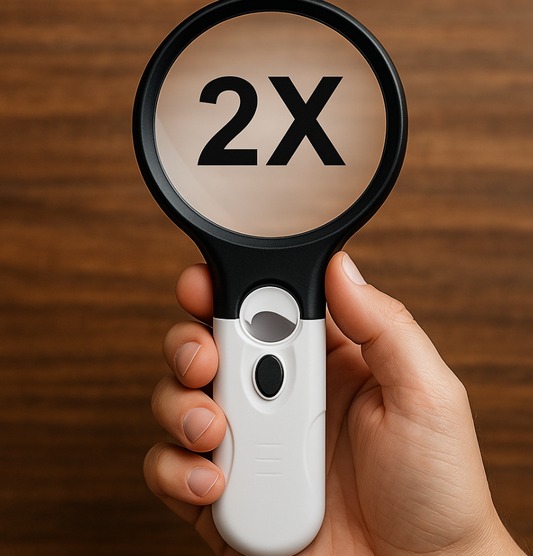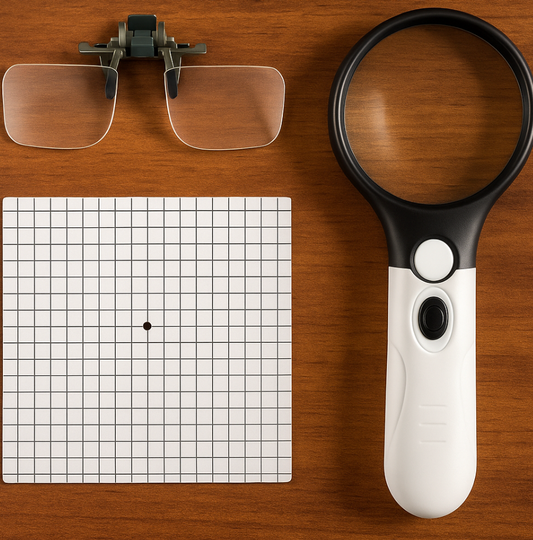Understanding Charles Bonnet Syndrome: Visual Hallucinations and Eye Disease
Share
Understanding Charles Bonnet Syndrome: Visual Hallucinations and Eye Disease
For many people, vision loss is a difficult and frustrating experience. However, for some, losing sight doesn’t just mean struggling to see—it can also mean seeing things that aren’t actually there. This phenomenon is known as Charles Bonnet Syndrome (CBS), a condition where individuals with significant vision loss experience visual hallucinations.
Despite its often frightening symptoms, CBS is not a sign of mental illness or dementia. Instead, it’s the brain’s way of compensating for lost visual input. For those who experience it, understanding what is happening—and receiving proper support from doctors, caregivers, and loved ones—can make a world of difference.
In this blog post, we’ll explore what Charles Bonnet Syndrome is, how it relates to eye diseases like macular degeneration, and why a strong support system is crucial for those affected.
What is Charles Bonnet Syndrome?
Charles Bonnet Syndrome was first described in the 18th century by Swiss naturalist Charles Bonnet, who noticed his grandfather—despite being nearly blind—was seeing vivid images of things that weren’t really there. Today, we understand CBS as a neurological response to vision loss rather than a psychiatric disorder.
Symptoms of Charles Bonnet Syndrome
The hallmark symptom of CBS is visual hallucinations that occur in people with significant vision impairment. These hallucinations can be:
- Simple patterns or colors (such as dots, grids, or flashing lights)
- Complex images (such as faces, animals, people, or landscapes)
- Static or moving—some people report seeing entire scenes unfold before their eyes
- Highly detailed and vivid, often appearing more real than a memory or dream
These hallucinations can last for a few seconds to several minutes and occur at random. Some people experience them daily, while others may only have them occasionally.
How is CBS Related to Eye Diseases?
CBS is most common in people with significant vision loss, especially due to eye diseases. When the eyes stop sending strong signals to the brain, the brain tries to fill in the missing information by generating its own images.
Eye Conditions Associated with CBS
1️⃣ Macular Degeneration – One of the leading causes of CBS, macular degeneration affects central vision, leaving blind spots. The lack of input from the retina may lead the brain to create hallucinations.
2️⃣ Glaucoma – As glaucoma damages the optic nerve, it can cause tunnel vision or complete blindness, leading to CBS hallucinations.
3️⃣ Diabetic Retinopathy – This condition causes retinal damage due to high blood sugar levels, increasing the risk of CBS.
4️⃣ Cataracts & Retinal Detachment – Both can cause significant vision loss, leading to CBS symptoms.
Although CBS is most common in people with partial or severe vision loss, it is not linked to mental illness, dementia, or cognitive decline. Understanding this distinction is crucial to reducing unnecessary anxiety in those experiencing symptoms.
The Psychological Impact of CBS
For many people, the first hallucination is alarming. Some may worry they are developing a neurological disorder, like schizophrenia or dementia. Others may be too embarrassed to tell their doctor or loved ones, fearing judgment or disbelief.
Common emotional reactions to CBS include:
- Fear or anxiety – Especially if the hallucinations are lifelike or appear suddenly
- Confusion – Many individuals struggle to understand what they are experiencing
- Frustration – Some people feel powerless because they can’t control the hallucinations
- Relief – Once they learn that CBS is a known condition and not a sign of dementia, many feel reassured
This is why education and support from doctors, caregivers, and family members is so important.
Why Doctor and Family Support is Essential
Medical Support: The Role of Eye Doctors and Physicians
Doctors play a crucial role in helping patients with CBS. Many people suffering from hallucinations may feel distressed but are too afraid to mention their symptoms. That’s why eye doctors and primary care physicians should actively screen for CBS in patients with vision loss.
When discussing CBS, doctors should:
✔ Educate patients – Reassure them that CBS is not a mental illness, but rather a natural response to vision loss.
✔ Rule out other conditions – In rare cases, hallucinations could indicate a neurological disorder. A proper diagnosis is key.
✔ Provide coping strategies – There is no cure for CBS, but simple strategies can help (more on this below).
Additionally, some patients may benefit from low-vision therapy, occupational therapy, or even medication if their hallucinations are particularly distressing.
Family Support: The Role of Loved Ones
A strong support system is just as important as medical care. Many CBS patients feel isolated or misunderstood. Here’s how family members can help:
- Listen without judgment – If a loved one mentions hallucinations, take them seriously and reassure them that it’s a known condition.
- Encourage a doctor’s visit – Many patients don’t realize CBS is common. A doctor’s reassurance can provide peace of mind.
- Help identify triggers – Some people notice their hallucinations are worse in dim lighting or when they are tired. Adjusting the environment may help.
- Be patient – Even if the hallucinations seem strange or outlandish, avoid dismissing them.
The more people understand CBS, the less distressing it becomes for those experiencing it.
Coping Strategies for CBS
While there is no cure for Charles Bonnet Syndrome, certain strategies can help reduce hallucinations or their impact:
- Increase Lighting – Bright lighting may reduce hallucinations, especially at night.
- Change Eye Focus – Blinking, looking away, or shifting gaze can help "reset" the brain.
- Engage in Activity – Keeping the brain engaged with music, conversation, or movement may reduce hallucinations.
- Reduce Stress & Fatigue – Stress and exhaustion can make CBS symptoms worse, so relaxation techniques may help.
- Use Low-Vision Aids – Magnifiers, talking devices, and voice-assisted technology can help those with severe vision loss maintain independence.
If hallucinations are frequent and distressing, some doctors may prescribe medications like anticonvulsants or SSRIs, though these are typically a last resort.
Conclusion: Living with CBS
Charles Bonnet Syndrome is a surprisingly common yet often misunderstood condition that affects people with vision loss. The key to managing CBS lies in awareness, education, and support.
For patients – If you or a loved one experiences CBS, know that you are not alone. Understanding that these hallucinations are a normal response to vision loss can make them less distressing.
For doctors – Bringing up CBS during eye exams can prevent unnecessary fear and help patients feel reassured.
For family members – Your support and patience can make a huge difference in helping a loved one navigate CBS.
Though CBS can be unsettling, with the right knowledge and support, people can learn to live with it—and even find ways to lessen its impact.



